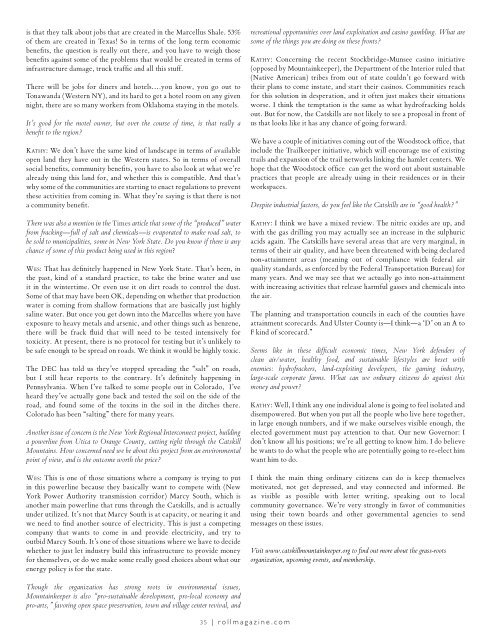Create successful ePaper yourself
Turn your PDF publications into a flip-book with our unique Google optimized e-Paper software.
is that they talk about jobs that are created in the Marcellus Shale. 53%of them are created in Texas! So in terms of the long term economicbenefits, the question is really out there, and you have to weigh thosebenefits against some of the problems that would be created in terms ofinfrastructure damage, truck traffic and all this stuff.There will be jobs for diners and hotels….you know, you go out toTonawanda (Western NY), and its hard to get a hotel room on any givennight, there are so many workers from Oklahoma staying in the motels.It’s good for the motel owner, but over the course of time, is that really abenefit to the region?Kathy: We don’t have the same kind of landscape in terms of availableopen land they have out in the Western states. So in terms of overallsocial benefits, community benefits, you have to also look at what we’realready using this land for, and whether this is compatible. And that’swhy some of the communities are starting to enact regulations to preventthese activities from coming in. What they’re saying is that there is nota community benefit.There was also a mention in the Times article that some of the “produced” waterfrom fracking—full of salt and chemicals—is evaporated to make road salt, tobe sold to municipalities, some in New York State. Do you know if there is anychance of some of this product being used in this region?Wes: That has definitely happened in New York State. That’s been, inthe past, kind of a standard practice, to take the brine water and useit in the wintertime. Or even use it on dirt roads to control the dust.Some of that may have been OK, depending on whether that productionwater is coming from shallow formations that are basically just highlysaline water. But once you get down into the Marcellus where you haveexposure to heavy metals and arsenic, and other things such as benzene,there will be frack fluid that will need to be tested intensively fortoxicity. At present, there is no protocol for testing but it’s unlikely tobe safe enough to be spread on roads. We think it would be highly toxic.The DEC has told us they’ve stopped spreading the “salt” on roads,but I still hear reports to the contrary. It’s definitely happening inPennsylvania. When I’ve talked to some people out in Colorado, I’veheard they’ve actually gone back and tested the soil on the side of theroad, and found some of the toxins in the soil in the ditches there.Colorado has been “salting” there for many years.Another issue of concern is the New York Regional Interconnect project, buildinga powerline from Utica to Orange County, cutting right through the CatskillMountains. How concerned need we be about this project from an environmentalpoint of view, and is the outcome worth the price?Wes: This is one of those situations where a company is trying to putin this powerline because they basically want to compete with (NewYork Power Authority transmission corridor) Marcy South, which isanother main powerline that runs through the Catskills, and is actuallyunder utilized. It’s not that Marcy South is at capacity, or nearing it andwe need to find another source of electricity. This is just a competingcompany that wants to come in and provide electricity, and try tooutbid Marcy South. It’s one of those situations where we have to decidewhether to just let industry build this infrastructure to provide moneyfor themselves, or do we make some really good choices about what ourenergy policy is for the state.recreational opportunities over land exploitation and casino gambling. What aresome of the things you are doing on these fronts?Kathy: Concerning the recent Stockbridge-Munsee casino initiative(opposed by Mountainkeeper), the Department of the Interior ruled that(Native American) tribes from out of state couldn’t go forward withtheir plans to come instate, and start their casinos. Communities reachfor this solution in desperation, and it often just makes their situationsworse. I think the temptation is the same as what hydrofracking holdsout. But for now, the Catskills are not likely to see a proposal in front ofus that looks like it has any chance of going forward.We have a couple of initiatives coming out of the Woodstock office, thatinclude the Trailkeeper initiative, which will encourage use of existingtrails and expansion of the trail networks linking the hamlet centers. Wehope that the Woodstock office can get the word out about sustainablepractices that people are already using in their residences or in theirworkspaces.Despite industrial factors, do you feel like the Catskills are in “good health?”Kathy: I think we have a mixed review. The nitric oxides are up, andwith the gas drilling you may actually see an increase in the sulphuricacids again. The Catskills have several areas that are very marginal, interms of their air quality, and have been threatened with being declarednon-attainment areas (meaning out of compliance with federal airquality standards, as enforced by the Federal Transportation Bureau) formany years. And we may see that we actually go into non-attainmentwith increasing activities that release harmful gasses and chemicals intothe air.The planning and transportation councils in each of the counties haveattainment scorecards. And Ulster County is—I think—a ‘D’ on an A toF kind of scorecard.”Seems like in these difficult economic times, New York defenders ofclean air/water, healthy food, and sustainable lifestyles are beset withenemies: hydrofrackers, land-exploiting developers, the gaming industry,large-scale corporate farms. What can we ordinary citizens do against thismoney and power?Kathy: Well, I think any one individual alone is going to feel isolated anddisempowered. But when you put all the people who live here together,in large enough numbers, and if we make ourselves visible enough, theelected government must pay attention to that. Our new Governor: Idon’t know all his positions; we’re all getting to know him. I do believehe wants to do what the people who are potentially going to re-elect himwant him to do.I think the main thing ordinary citizens can do is keep themselvesmotivated, not get depressed, and stay connected and informed. Beas visible as possible with letter writing, speaking out to localcommunity governance. We’re very strongly in favor of communitiesusing their town boards and other governmental agencies to sendmessages on these issues.Visit www.catskillmountainkeeper.org to find out more about the grass-rootsorganization, upcoming events, and membership.Though the organization has strong roots in environmental issues,Mountainkeeper is also “pro-sustainable development, pro-local economy andpro-arts,” favoring open space preservation, town and village center revival, and35 | rollmagazine.com




